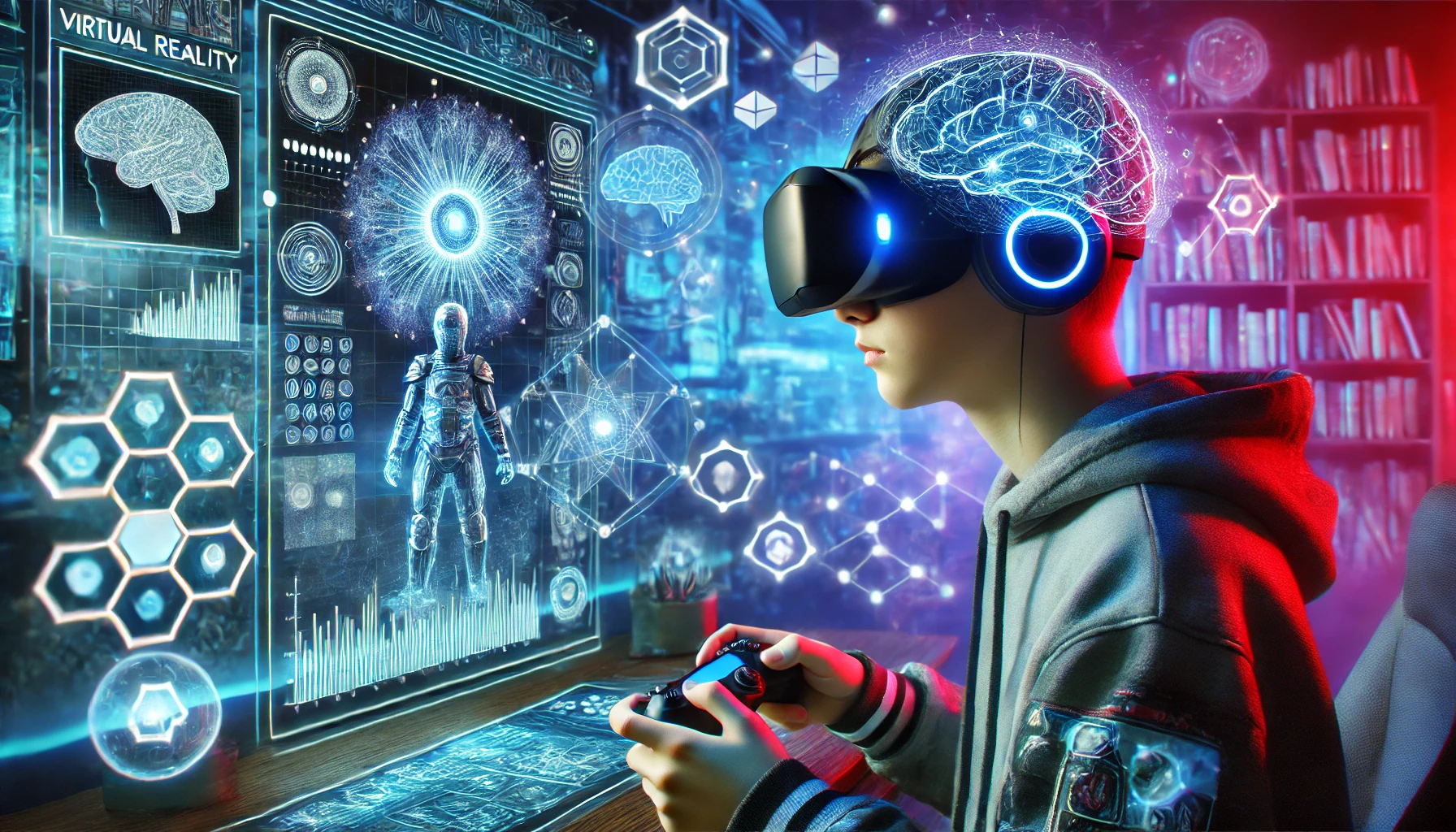“The Impact of Video Games on Brain Function and Thinking Skills”
Explore how video games influence brain function and thinking skills, enhancing problem-solving, memory, and decision-making while addressing potential drawbacks.
Introduction:
Video games have evolved from simple entertainment to complex, immersive experiences that challenge the brain in various ways. While some people believe that gaming negatively affects mental health and productivity, scientific research suggests that video games can enhance cognitive functions such as problem-solving, memory, and decision-making. However, excessive gaming can also lead to certain drawbacks, including addiction and reduced social interaction. In this article, we will explore the impact of video games on brain function and thinking skills, highlighting both the benefits and potential downsides.
>How Video Games Enhance Brain Function:
1. Boosting Problem-Solving and Critical Thinking;
Video games require players to solve puzzles, strategize, and make quick decisions, all of which contribute to improved problem-solving skills. Games like Minecraft, The Legend of Zelda, and Portal challenge players to think creatively and adapt to different situations.
- Encourages Logical Thinking: Players analyze problems and develop solutions, improving their critical thinking abilities.
- Enhances Decision-Making: Many video games present players with choices that impact the outcome, improving decision-making skills.
- Improves Strategic Planning: Strategy-based games require players to plan ahead, anticipate consequences, and adjust their approach.
2. Strengthening Memory and Cognitive Flexibility;
Video games demand players to remember objectives, maps, and key details, strengthening both short-term and long-term memory.
- Enhances Working Memory: Games like Call of Duty and Fortnite require players to track multiple objectives simultaneously.
- Improves Multitasking: Many video games involve managing several tasks at once, enhancing cognitive flexibility.
- Develops Spatial Awareness: Navigating virtual environments improves spatial reasoning skills, which are useful in real-world situations.
3. Increasing Attention Span and Focus;
Many video games require players to concentrate for extended periods, training the brain to maintain focus.
- Improves Selective Attention: Players learn to filter out distractions and focus on important details.
- Enhances Sustained Attention: Long gaming sessions train the brain to maintain focus over time.
- Boosts Visual Processing Skills: Fast-paced games improve the ability to track moving objects and react quickly.
4. Enhancing Hand-Eye Coordination and Reflexes;
Games that require precise movements and quick reactions, such as racing or shooting games, help improve hand-eye coordination and reflex speed.
- Develops Motor Skills: Coordinating controller movements with on-screen actions strengthens motor function.
- Enhances Reaction Time: Players learn to react quickly to changes in the game environment.
- Improves Precision and Accuracy: Many games require players to aim, shoot, or maneuver with accuracy.
>Potential Drawbacks of Video Games:
While video games offer cognitive benefits, excessive playtime can lead to negative consequences.
1. Gaming Addiction and Reduced Productivity;
- Risk of Overindulgence: Some players develop an unhealthy reliance on video games, leading to addiction.
- Decline in Academic or Work Performance: Excessive gaming can distract from responsibilities.
- Lack of Sleep: Late-night gaming sessions can disrupt sleep patterns, affecting overall brain function.
2. Increased Aggression and Emotional Sensitivity;
Some studies suggest that violent video games may lead to increased aggression in certain players.
- Higher Aggression Levels: Prolonged exposure to violent content may desensitize players to real-world violence.
- Reduced Emotional Control: Some gamers experience frustration or anger when they lose, impacting their emotional stability.
3. Social Isolation and Physical Health Concerns;
- Reduced Social Interaction: Spending too much time gaming can limit face-to-face interactions.
- Lack of Physical Activity: Prolonged gaming sessions contribute to a sedentary lifestyle.
- Eye Strain and Fatigue: Extended screen time can lead to headaches and decreased concentration.
>Balancing Gaming for Maximum Cognitive Benefits;
To enjoy the positive effects of video games without the drawbacks, moderation is key.
- Limit Playtime: Set specific gaming hours to avoid overuse.
- Take Regular Breaks: Step away from screens to rest the brain and body.
- Engage in Physical Activities: Exercise to counteract the sedentary nature of gaming.
- Choose Brain-Boosting Games: Opt for games that challenge cognitive abilities rather than encourage passive play.
- Maintain Social Connections: Balance gaming with real-world social interactions.
Conclusion:
Video games significantly impact brain function and thinking skills, offering benefits such as improved problem-solving, memory, and reflexes. However, excessive gaming can lead to negative effects like addiction, aggression, and social isolation. Striking a healthy balance between gaming and other activities ensures that players can enjoy the cognitive benefits while minimizing risks. When played responsibly, video games can be a valuable tool for enhancing mental agility and cognitive development.
FAQs:
- How do video games improve brain function?
Video games enhance brain function by improving problem-solving, memory, attention span, and hand-eye coordination through engaging and interactive gameplay. - Can video games make you smarter?
Yes, certain video games challenge cognitive skills like critical thinking and multitasking, contributing to overall intellectual growth. - Are video games bad for mental health?
While moderate gaming has cognitive benefits, excessive play can lead to addiction, reduced productivity, and increased stress. - Do violent video games increase aggression?
Some studies suggest a link between violent video games and aggression, but the impact varies among individuals. - What types of games are best for cognitive development?
Puzzle, strategy, and simulation games like Chess, Brain Age, and Civilization are great for cognitive enhancement. - How can I maintain a healthy gaming routine?
Setting time limits, taking breaks, engaging in physical activities, and balancing gaming with social interactions can help maintain a healthy routine.


